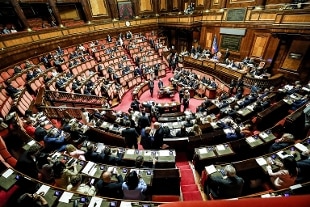- Mes: Gentiloni, no risk for Italy
- Di Maio brakes on the Mes: "We do not sign in the dark". Delrio: 5S do not cause a crisis of credibility
- Mes, Di Maio: "We don't sign in the dark", Franceschini: "You can't play with fire"
- It is a brawl on the Mes. Gualtieri: "Closed text, it protects us". The oppositions: Conte report
- Moscovici: "Mes is not a problem, rather a help for the banking system"
- There is no agreement on the Mes. Gualtieri defends the reform: "Attacked by those who signed it"
Share
01 December 2019All together around dinner time, this evening, for a "lockout the ranks" more than ever necessary in view of Prime Minister Conte's communications to the Houses scheduled for tomorrow at 13 in Montecitorio and at 3.30 pm in Palazzo Madama. An opportunity to dissolve positions and tensions after the very strong fibrillation in the government. Conflicting positions, above all, between Luigi Di Maio who expects changes to the reform of the Salva Stati fund and the premier Giuseppe Conte, with the Pd who tried a complicated mediation and called for a halt to hostilities to prevent the country from losing "credibility". The Mes process will continue, however, to provoke vitriolic comments and disruptive stances along all its stages, given that, after the meeting tonight evening and the double confrontation of the premier with the parliamentary halls of tomorrow, Wednesday the Mes will face two treacherous events: at 2 pm the hearing of the Governor of the Bank of Italy, Ignazio Visco, on the functioning of the European Stability Mechanism and its prospects for reform and half an hour later, in the Senate Finance Committee for the Draft of reform of the Treaty establishing the European Stability Mechanism (MES).Tension rises
However, the tension on the Mes continues to remain very high even outside the government. "The Mes steals from Italian savers to finance German banks," says Salvini, urging the prime minister to resign. While Giorgia Meloni states that "Conte is a serial liar and said lies about lies, going so far as to say that he had not made an agreement on the Mes. And I want to see if Di Maio remains a shred of dignity: I want to hear him say, proving not to think only in the armchair, that the government falls on this fraud ". Piero Fassino, vice president of the Foreign Affairs Committee of the Chamber, speaks of colossal buffalo: "That our money serves to save the German banks, as Salvini argues demagogically, is a colossal hoax. If ever it is the opposite: given the size of our public debt who could possibly be in a position to ask for help from the State Savings Fund would be Italy, not Germany ". And the EU commissioner, Paolo Gentiloni, warns to pay close attention to the words that are said because: "Describing the agreement on the Mes as a risk or even a conspiracy against Italy can fuel risks on markets that do not exist today", indeed , the state-saving mechanism is "a protective umbrella in the event of banking crises that cannot be managed with current instruments".
For Abi, the "Piave line" is the riskiness of government bonds
The president of the Abi, Antonio Patuelli, considers unacceptable that with the reform of the Salva-Stati (Mes) fund we discuss a "weighting" of risks for government bonds: "The safeguarding of the concept of non-riskiness of Government bonds it is a sort of line of the Piave ". Patuelli said he hoped that the reform would bring advantages for credit institutions also because "for now Italian banks have done almost everything on their own, paying over 12.5 billion euros to intervene in favor of institutions in resolution and for the various bailouts ".As for the effects of the reform, for Patuelli" is the one indicated by the Senate study service, which drew up a comparison between the original text of 2012 and the new text. From the outcome of this analysis it emerges that there are no upheavals : it is, in short, an update ". Patuelli stressed that government bonds "are so far exempt from risk and, therefore, for the banks that hold them do not involve any absorption of capital. Instead with the weighting the same securities would be labeled with a level of risk.

